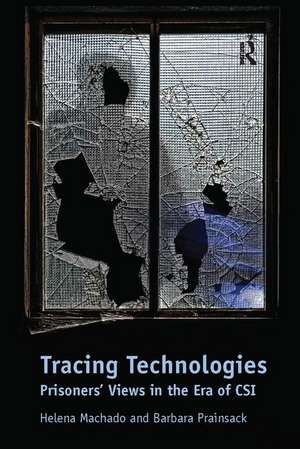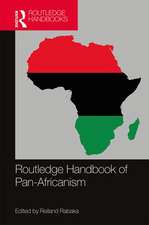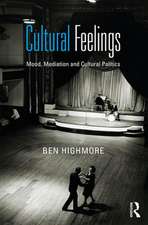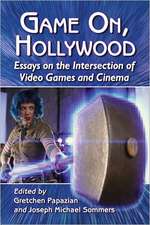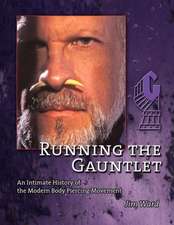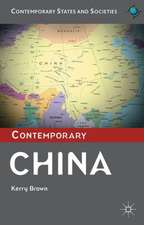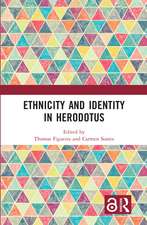Tracing Technologies: Prisoners' Views in the Era of CSI
Autor Helena Machado, Barbara Prainsacken Limba Engleză Paperback – 25 mai 2017
| Toate formatele și edițiile | Preț | Express |
|---|---|---|
| Paperback (1) | 413.13 lei 6-8 săpt. | |
| Taylor & Francis – 25 mai 2017 | 413.13 lei 6-8 săpt. | |
| Hardback (1) | 1058.65 lei 6-8 săpt. | |
| Taylor & Francis – 28 apr 2012 | 1058.65 lei 6-8 săpt. |
Preț: 413.13 lei
Nou
Puncte Express: 620
Preț estimativ în valută:
79.05€ • 82.54$ • 65.28£
79.05€ • 82.54$ • 65.28£
Carte tipărită la comandă
Livrare economică 15-29 aprilie
Preluare comenzi: 021 569.72.76
Specificații
ISBN-13: 9781138107502
ISBN-10: 1138107506
Pagini: 232
Dimensiuni: 156 x 234 x 12 mm
Greutate: 0.38 kg
Ediția:1
Editura: Taylor & Francis
Colecția Routledge
Locul publicării:Oxford, United Kingdom
ISBN-10: 1138107506
Pagini: 232
Dimensiuni: 156 x 234 x 12 mm
Greutate: 0.38 kg
Ediția:1
Editura: Taylor & Francis
Colecția Routledge
Locul publicării:Oxford, United Kingdom
Cuprins
Contents: Foreword, Troy Duster; Introduction; Setting the scene: Austria; Setting the scene: Portugal; Inside jobs: how to avoid crime scene traces; Biological traces: ’the evidence doesn’t lie’; In everybody, ’there’s always a bug inside’: does DNA profiling and databasing deter criminals?; Technologies of innocence: exoneration and exculpation; Criminal bodies and abusive authorities; Conclusion; Afterword: forensic DNA and the human sciences, Robin Williams; References; Glossary; References; Index.
Notă biografică
Helena Machado is Professor of Sociology at the University of Minho, Portugal and Barbara Prainsack is Professor of Sociology and Politics of Bioscience at Brunel University, UK
Recenzii
'... the book adds to the field's knowledge regarding the impact of the CSI effect on prisoners and is written for scholars and practitioners in the fields of criminal justice and legal studies. Additionally, individuals interested in forensics as well as those intrigued by the impact mass media has on our understanding of the legal system may benefit from this book.' International Criminal Justice Review 'Tracing Technologies offers a remarkably knowledgeable and clear account on the societal dimensions and implications of forensic and police uses of DNA analysis by two leading scholars in the field. It is the first empirical study to investigate prisoners' views on forensic technologies in the era of CSI, providing fascinating insights in a so far under-explored field of research.' Thomas Lemke, Goethe University Frankfurt, Germany 'This book is one of the rare cases where a highly specialised field of expert knowledge links to broader issues of social theory. Tracing the use of DNA-profiles in the criminal justice system in two European countries, Portugal and Austria, the authors develop a history of the techno-medical modern gaze on the criminal, with a specific focus on the reflexive view of the prisoners, i.e. the subjects primarily targeted by this technology. Stretching from close scrutiny of empirical analysis to a bird's eye perspective on cultural, political and societal structures Machado and Prainsack demonstrate the close linkages of surveillance, modernity and technology. This book will inform scholars of criminology, forensic sciences, science and technology studies and social theory alike.' Reinhard Kreissl, Institut für Rechts- und Kriminalsoziologie, Austria 'The book is a helpful and informative source for all those people who are aware of and also research the impact that 'genetic information' has on today's society.' Austrian Journal of Political Science 'By giving prisoners a voice in the debate, Machado and Prainsack make a valuable c
Descriere
Through critically engaging with STS, sociological and criminological perspectives on the use of DNA technologies within the criminal justice system, this work provides the reader with valuable insights into the effect of different legal, political, discursive, and historical configurations on how crime scene technologies are utilized by the police and related to by convicted offenders.
